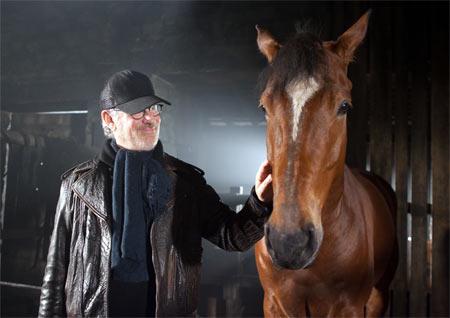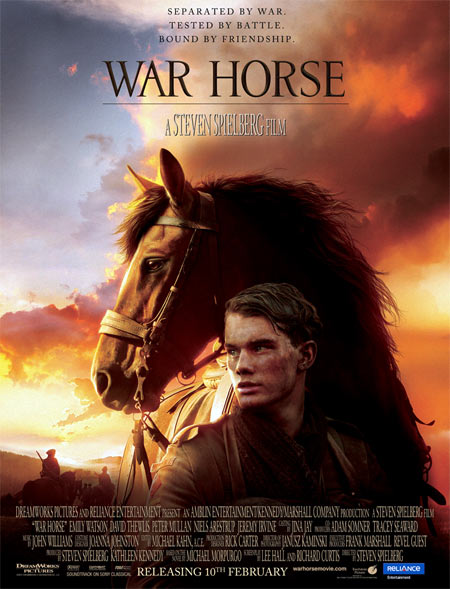 | « Back to article | Print this article |
How Steven Spielberg's War Horse came about
Steven Spielberg's acclaimed war epic film War Horse is set to open in theatres in India February 10. The film is in contention for six 2011 Academy awards and has also won five BAFTA nominations.
The ace filmmaker talks about his new film and how he set out to make a film about horses, among other things.
Were you nervous at all about the idea of working with horses? How did you approach getting the performances you needed?
The thing is, I haven't made a lot of horse movies. Usually in my movies, and in most people's movies, in Westerns and the Indiana Jones films for instance, a horse is something that Harrison Ford rides on.
My job is to draw attention to Indiana Jones, not his trusted steed. And so horses are usually taken for granted. The horse is just what gets the Western hero or the intrepid archeologist from point A to point B. You are never supposed to look at the horse. You're supposed to look at the guy on top of the horse. And yet I live with horses and have lived with horses for the last 15 years.
I've gotten to know how expressive horses are. This is long before War Horse, by the way. But just living with horses for so many years, I know that they really do convey tremendous expression, and it's easy for anybody to read. But movies don't often require us to spend any time dwelling on how the horse is feeling.
So in this case, when I saw what the puppeteers had done so brilliantly on stage with the play War Horse, I realized that they weren't forcing the horse to act like a human. They weren't giving the horse characteristics that we can identify with because the horse was doing things out of the ordinary realm of basically horse value, but they were simply replicating the behavior of horses that we all know but most of us don't observe.
That's what makes the play so brilliant, that the puppeteers didn't try to anthropomorphize the horses into human form, they just stayed horses, but the puppeteers were brilliantly responsive to how the humans on stage were interacting with the horses. I didn't know whether I could get that on film or not, but I did. Bobby Lovgren, our kind of horse whisperer who had done Seabiscuit with us, came on board to make the picture with us. He and his team performed miracles with the horses.
How Steven Spielberg's War Horse came about
The small village of Castle Combe provided a picturesque setting for several scenes. How was it to stage those scenes in that little village?
The village was offered to us almost like a movie set in waiting. It was just incredible. When I first got to Castle Combe and looked around, I said, "Was this built for tourists? What was this built for?" It had so much movie etiquette about it. But no, it's a beautiful little village and quaint and out of the way. You don't really relate to it as a place. You've never seen anything like it before.
It was the perfect place for the purchase of Joey, when Peter Mullan drunkenly buys a horse he shouldn't have purchased in the first place, but where I think faith lent a hand.
It's also the place from where the boys go blithely off to war, thinking they'd be home by Christmas, which everybody thought when they signed up to fight in France. It turned out to be a four-year, entrenched war of attrition.
How Steven Spielberg's War Horse came about
Once Joey is sold to the British Army, could you tell us about the characters we meet there played by Tom Hiddleston and Benedict Cumberbatch?
Tom Hiddleston, who plays Captain Nicholls, and Benedict Cumberbatch, Major Stewart, were both actors that I wanted to work with. I had seen Benedict on British television before and really sought him out and went after him.
I didn't know Tom Hiddleston that well but I saw him in a couple of smaller parts in films and thought he was kind of the reincarnation of Errol Flynn. I thought, "Wouldn't it be great to have the first person who purchases Joey from the father be this sort of dashing, classy, classic British hero?"
And so we kind of threw caution to the wind. Instead of casting against type, I went directly, a little bit on the nose, and found a very suave and sophisticated and very mindful young soldier.
You feel that Stewart and Nicholls knew each other...maybe went to school together and their families knew each other and they joined up together. Major Stewart, Benedict's character, probably took the military more seriously, so he achieved a higher rank than Nicholls, Tom Hiddleston's character. But you do feel a brotherhood between them even though they're playing rank. They're playing off each other in terms of rank; a little bit of competitive ego.
Nicholls is a sketcher; he's a sketch artist and when you see him sketching Joey, you know Joey is in good hands the second you see how well he sketches him. He's putting time into his horse, not his kit, which he has to get ready for a five o'clock departure the next morning for France across the English Channel. He's spending all of his time sketching this horse he's become infatuated with. And that horse is in safe hands at that point.


